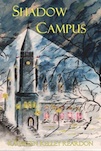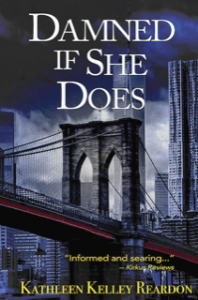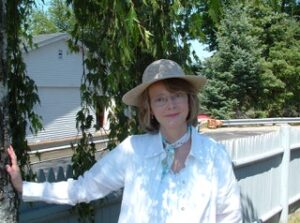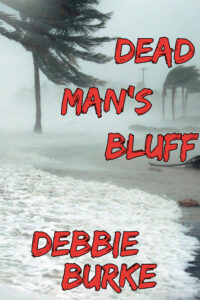Today, I’m visiting with mystery author Kathleen Reardon, Ph.D. She is professor emerita in management at the University of Southern California’s Marshall School of Business and now lives in Ireland. Her website is aptly named comebacksatwork.com because she is an expert in comebacks!
We “met” through the Authors Guild discussion group while discussing new strategies for book launches during the pandemic. The more we “talked,” the more I thought her story of persistence in the face of daunting setbacks would interest TKZ readers.
While Kathleen’s accomplishments are extraordinary, the challenges she had to overcome are even more extraordinary.
Welcome to The Kill Zone, Kathleen!
Debbie: Your background is academia and you have written numerous award-winning, bestselling business books. What prompted you to write fiction?
Kathleen: As a teenager, I loved writing fiction and poetry. My junior year English teacher, Judith Kase, was particularly encouraging. Back then, I expected to be a writer and English teacher for life, but my career took me on to an MA and Ph.D. in communication sciences, college teaching and research. There was little time for creative writing, especially prior to tenure. At thirty-two, I was diagnosed with breast cancer. Recovery took a while as did salvaging my career.
 The fiction writing bug finally bit and wouldn’t let go in my early forties. My father had encouraged me to write fiction. He thought I’d pushed it aside long enough, but there was still the challenge of becoming a full professor. I also had three young children. So, I wrote most of Shadow Campus, my debut novel, during summer breaks until 2012 when I focused and got it done.
The fiction writing bug finally bit and wouldn’t let go in my early forties. My father had encouraged me to write fiction. He thought I’d pushed it aside long enough, but there was still the challenge of becoming a full professor. I also had three young children. So, I wrote most of Shadow Campus, my debut novel, during summer breaks until 2012 when I focused and got it done.
DB: What was the spark for this book and/or your series? Please share how you came to write it.
KR: The spark for Shadow Campus was being the first woman to go up for tenure at a top business school. Breaking the glass ceiling is never easy. Change is hard. Sometimes resistance leads to incivility. One day I woke up early and began writing. Over the next week, I got the bones of the story on paper. I just couldn’t stop. Shadow Campus was born that week and I was en route to becoming a mystery author.
 Damned If She Does (2020) is a stand-alone sequel. Here again, the spark was experience as a female professor. I wrote most of the novel before MeToo began. It’s first and foremost a New York City crime mystery. But fiction often conveys messages about reality. A major subplot deals with abuse and the potential consequences of secrecy. Is there a best way forward? Is it better personally and for society to identify a perpetrator? Or are women damned if we do and damned if we don’t?
Damned If She Does (2020) is a stand-alone sequel. Here again, the spark was experience as a female professor. I wrote most of the novel before MeToo began. It’s first and foremost a New York City crime mystery. But fiction often conveys messages about reality. A major subplot deals with abuse and the potential consequences of secrecy. Is there a best way forward? Is it better personally and for society to identify a perpetrator? Or are women damned if we do and damned if we don’t?
DB: A reviewer of your debut novel draws an interesting comparison between academia and organized crime! Is there an element of truth? Does it apply to Damned If She Does too?
KR: In my nonfiction, especially The Secret Handshake and It’s All Politics, I write about levels of politics in organizations from church choirs to multinationals – the worst of these is pathological politics. In my first trade book, They Don’t Get It, Do They?,as well as my Harvard Business Review classic, “The Memo Every Woman Keeps in Her Desk,” my focus was on the challenging road many women travel when they endeavor to be recognized and promoted for exceptional work. Weaved throughout both of my novels are insights from that work.
In Shadow Campus, Meg has all the credentials for promotion. Yet, in the opening scene – the night before her tenure decision – she is found hanging in her office, nearly dead. We learn that this crime was facilitated by several characters. I think that’s what the reviewer saw as “organized crime.”
DB: Readers are interested in your particular process for writing. Do you have special or unique techniques you use?
KR: People ask me how I keep readers from knowing who did it. The answer: I hide it from myself. Any of the primary characters could be the killer and I keep several as candidates until near the end. It’s a lot like spinning a number of plates, but that’s what I enjoy about mysteries. If I know precisely “who done it” while writing, there’s a good chance that I’ll accidentally telegraph that to my readers. So, keeping me in the dark keeps them in the dark too. I truly enjoy that aspect.
DB: You “interviewed” one of your main characters for a post on your website. What a great idea (which I’m going to steal)! Tell us about that.
KR: Shamus Doherty, Meg’s older brother, is a diamond in the rough. Many women who’ve read my two novels consider him very appealing. He’s complex and caring but a bit rough around the edges – gruff when he means to be tender. These characteristics wreak havoc with his love life. He can be overbearing as an older brother. To his credit, however, he does learn.
My interview with him was a chance to get inside his head a bit. He didn’t want to be interviewed, but he felt obliged because I’d created him. His wit and charm came through. I merely wanted to give him a chance to speak for himself. I can hear him now denying that altruistic claim. Be that as it may, I think he kind of likes me.
DB: Is there anything else you’d like to share with TKZ?
KR: I was fortunate to attend an Authors Guild webinar with Margaret Atwood and Judy Blume. It was great. Margaret said you need to grab the reader by page 5. By then he or she knows whether this is a door worth walking through. I think that’s great advice. Judy said she misses the freshness of being a new author. That’s food for thought. How do we get that back each time we sit down to write? I tend to take walks, enjoy nature, step away from the story and then allow myself to become enthused with where the characters are likely to take me next.
Book three of the trilogy is calling me. It will be based in West Cork, Ireland.
Thank you, Kathleen, for visiting TKZ! Congratulations on your new release, Damned If She Does, which Kirkus Reviews named among “Great Indie Books Worth Discovering.”
~~~
TKZers: Do you have special tricks that propel you over the hurdles of writing? Have you come back from misfortune?
~~~
Debbie Burke’s thriller, Dead Man’s Bluff, is available for pre-order at this link for only $.99. Publication date: June 23.



Thank you, Debbie for doing this interview. Shamus, of course, will be mortified! 🙂 I’m delighted to be among such wonderful writers. Reading the bios of the eleven of you is an inspiration.
Hi Kathleen,
Shamus will just have to get over it!
Thanks for visiting TKZ. I enjoyed “talking” with you.
Thanks, Kathleen and Debbie. Always nice to hear about another writer’s journey and methods. The “spinning plates” method is one used by the writers of the old Perry Mason TV series. In the early scenes you’d get 3-4 people with a motive to kill the victim…and 1 or 2 who seem not to have one. Inevitably, one of the latter would stand up in the gallery and tearfully confess because of Mason’s masterful cross-examination of a witness. (Happens all the time in real life).
Jim, thanks for the great memory of those old Perry Mason episodes!
Funny how Perry’s clients were always innocent.
I hadn’t thought of Perry Mason. So true. It would be great to see reruns. I’ve certainly heard writers recommend a more organized approach. But for me the joy is in the mystery of the mystery, so to speak.
I just bought two of your writing advice books, James. Looking forward to reading them. Others are on my wish list. Our paths have crossed a few times in California or we just missed each other. Good to have met this time even if virtually.
Thanks to the both of you for this interview. I love learning about other authors’ “tricks” for staying engaged with a WIP, and process from germ, to seed, to plant, to fruit.
I love interviewing my characters! I invite them (one at a time, of course-I’m an avowed introvert) for coffee and throw out an impertinent question, then sit back and wait. It’s great fun, and so, so revealing. I’ve learned secrets, motivations, and aspirations that build flesh on the bones of my story.
Thanks again, Debbie and Kathleen, for taking the time to visit with us.
Glad you enjoyed it, Deb.
Throwing out an “impertinent question” is a terrific way to stir up a character’s secrets.
Thanks, Deb. I like your idea of inviting characters for coffee and throwing out impertinent questions. I look forward to doing that very soon.
Debbie and Kathleen,
I loved this interview! I especially enjoyed Kathleen’s technique of not knowing the villain as she writes the novel.
Kathleen, I’ll be interested to read your novel. As a mystery writer myself with the added bonus of being married to a college professor turned department chair, I’m well aware of the motivations for mayhem within the ivy-encrusted walls of academia. My husband will certainly want to read your work as well since he is currently working on a romance/mystery novel that takes place in the graduate student community of a university! (We just can’t seem to escape from the ivory tower.) ?
Best wishes for all your future works.
Kay, Kathleen’s books do sound right up yours and your husband’s ivy-covered alley.
Debbie, thanks for introducing us to Kathleen’s work.
My pleasure, Kay.
HI Debbie: Yes, academia is not at all exempt from pathological politics. I’m surely not telling you or your husband anything new. I hope you both enjoy Shadow Campus and Damned If She Does. Let me know.
Thank you for the great interview, Debbie and Kathleen. I’m a veteran of the mining industry have been a fan of Kathleen’s non-fiction for decades — in particular Persuasion in Practice, The Skilled Negotiator, and Comebacks at Work.
Thanks for stopping by, Louis.
Delighted to hear this, Louis. We go way back with Persuasion in Practice being one of your favorites. It’s still selling! Great to have connected. All the best, Kathleen
Great interview, and welcome, Kathleen. if you are stopping by.
My intended path was academia, and I have siblings and their kids who followed that path. Universites are like the game of thrones, but most of the characters are afraid of blood, literal and metaphorical, and are passive aggressive. The good news is the worst of these people are removed from the general population where they would become bureaucrats. The bad news, they are teaching our kids.
Thanks for a chuckle, Marilynn. Humans are so doggone…human, no matter the venue or profession they’re in.
Marilynn: Thank you. Survival does depend on being able to read the tea leaves. Fortunately, in my work writing The Secret Handshake and It’s All Politics, I learned a good deal about doing that. Then again, learning a great deal about politics in the workplace led to those books. It also allowed me to survive and thrive as did my mother and father being willing to talk about work in my presence. Fortunately, I also had many very good colleagues. They helped me learn the ropes. And I helped others. We need to do that. K
Sorry I’m late! Great interview, you two. Really enjoyed it.
Sue, you’re never late. TKZ is open 24/7 🙂
Love your website, Sue. I stopped by and will spend more time there. Lots to help the crime writer. Very inviting!